推荐七年级英语上册Unit6Doyoulikebananas(第三课时)SectionAGrammerfocus-3c导学案(无答案)(新版)人
- 格式:doc
- 大小:25.00 KB
- 文档页数:2
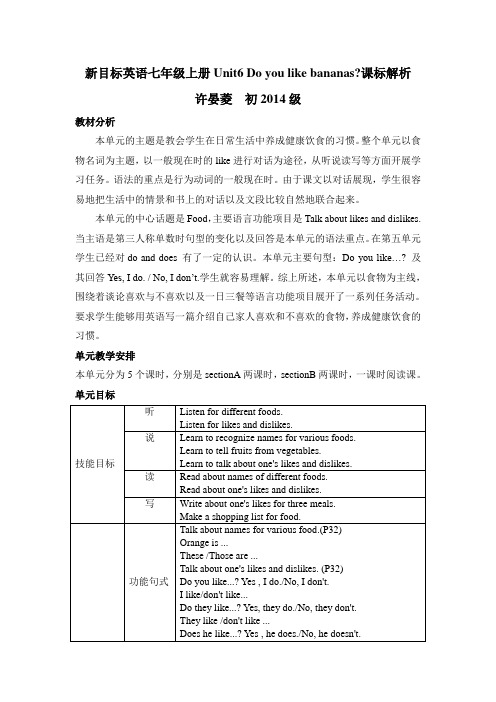
新目标英语七年级上册Unit6 Do you like bananas?课标解析
许晏菱初2014级
教材分析
本单元的主题是教会学生在日常生活中养成健康饮食的习惯。
整个单元以食物名词为主题,以一般现在时的like进行对话为途径,从听说读写等方面开展学习任务。
语法的重点是行为动词的一般现在时。
由于课文以对话展现,学生很容易地把生活中的情景和书上的对话以及文段比较自然地联合起来。
本单元的中心话题是Food,主要语言功能项目是Talk about likes and dislikes.当主语是第三人称单数时句型的变化以及回答是本单元的语法重点。
在第五单元学生已经对do and does 有了一定的认识。
本单元主要句型:Do you like…? 及其回答Yes, I do. / No, I don’t.学生就容易理解。
综上所述,本单元以食物为主线,围绕着谈论喜欢与不喜欢以及一日三餐等语言功能项目展开了一系列任务活动。
要求学生能够用英语写一篇介绍自己家人喜欢和不喜欢的食物,养成健康饮食的习惯。
单元教学安排
本单元分为5个课时,分别是sectionA两课时,sectionB两课时,一课时阅读课。
单元目标
课时目标
思想情感目标:
1)通过学习文章,学会养成健康饮食的习惯。
2)学习养成节约粮食,爱惜食物的品质。
能力发展目标:
1)能掌握书面表达的基本写法。
2)能正确使用可数名词和不可数名词。
3)能掌握一般现在时的结构、意义和用法。

单元教案Do you like bananas?教材依据:新目标英语七年级上册第六单元教学目标(一)语言知识1、词汇:本单元所要求掌握的所有词汇2、日常交际用语:Do you like …? Yes,I do./No, I don’t.I /They like oranges. I/They don’t like bananas.She likes salad. She doesn’t like salad.3、教学重点:1、掌握各种不同的有关食物方面的名词;2、实义动词like 一般现在时的否定式、疑问式及其答语;3、助动词do /does和don’t/doesn’t的用法;4、一日三餐的营养搭配5、小短文的写作4、教学难点:1、Affirmative and negative statements2、Countable nouns and uncountable nouns3、How to talk about likes and dislikes(二)语言技能学生能认识及听懂各种不同的食物名称,区分可数名词和不可数名词,并能自由表达出自己喜欢和不喜欢的食物;能根据单元所学句型自编对话,讨论自己及他人喜欢和不喜欢的食物并扩展到其他方面(如sports),能进行小组讨论并用英语进行简单的陈述(I like…, I don’t like …,he likes…,he doesn’t like….),能进行一日三餐的营养搭配,能根据课前任务收集和整理资料,并对所得资料进行加工和处理,在课堂中合理地加以运用。
(三)学习策略通过学习课文,掌握有关饮食方面的词汇,并结合所学单词,自由讨论喜好。
通过在课文中交流彼此的特长和爱好,培养群体意识,并在小组讨论及合作中,学会合作学习与研究性学习,完成所给任务,努力开拓课程资源。
(四)情感态度激发学生英语学习的欲望和兴趣,敢于用英语进行交流和表达; 营造情感交融的良好氛围,努力提高学生的学习兴趣,学生自主学习、主动合作;认真完成课前任务,在调查中充分发挥自身潜力,培养思维能力、动手能力、开展研究性学习;(五)文化意识能了解东西方不同的饮食文化。
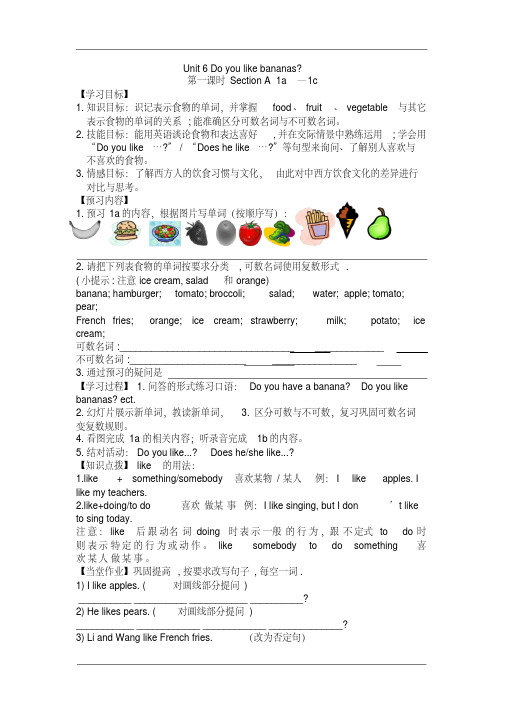
Unit 6 Do you like bananas?第一课时Section A 1a—1c【学习目标】1.知识目标:识记表示食物的单词,并掌握food、 fruit、 vegetable与其它表示食物的单词的关系;能准确区分可数名词与不可数名词。
2.技能目标:能用英语谈论食物和表达喜好,并在交际情景中熟练运用;学会用“Do you like…?” /“Does he like…?”等句型来询问、了解别人喜欢与不喜欢的食物。
3.情感目标:了解西方人的饮食习惯与文化,由此对中西方饮食文化的差异进行对比与思考。
【预习内容】1.预习1a的内容,根据图片写单词(按顺序写):2.请把下列表食物的单词按要求分类,可数名词使用复数形式.(小提示:注意ice cream, salad和orange)banana; hamburger; tomato; broccoli; salad; water; apple; tomato; pear;French fries; orange; ice cream; strawberry; milk; potato; ice cream;可数名词:_________________________________ _____________不可数名词:______________________ ________________3.通过预习的疑问是【学习过程】1.问答的形式练习口语:Do you have a banana? Do you like bananas? ect.2.幻灯片展示新单词,教读新单词,3.区分可数与不可数,复习巩固可数名词变复数规则。
4.看图完成1a的相关内容;听录音完成1b的内容。
5.结对活动:Do you like...? Does he/she like...?【知识点拨】like 的用法:1.like + something/somebody 喜欢某物/某人例:I like apples. I like my teachers.2.like+doing/to do喜欢做某事例:I like singing, but I don’t like to sing today.注意:like后跟动名词doing时表示一般的行为,跟不定式to do时则表示特定的行为或动作。

Unit 6Do you like bananas?Period 1(Section A 1a-1c)Teaching aims1. Learn words and be able to say, read and write them:orange(s), banana(s), strawberry, strawberries, pear(s), apple(s),tomato(es), carrot(s), vegetable(s), hamburger(s), egg(s), ice-cream(s),salad(s), bread, chicken2. Be able to talk about likes and dislikes by using:I/We/They like oranges. He/She likes oranges.I /We/They don’t likebananas. He/She doesn’t like hamburgers.Do you like salad? Yes, I do./No, I don’t.Does he/she like tomatoes? Yes, he/she does. / No, he/she doesn’t.3.Understand the difference between countable nouns and uncountable nouns.Teaching key and difficult points:1.Learn these words and be able to say, read and write them:2.Be able to talk about likes and dislikes by using:I/We/They like oranges. He/She likes oranges.I /We/They don’t likebananas. He/She doesn’t like hamburgers.Do you like salad? Yes, I do./No, I don’t.Does he/she like tomatoes? Yes, he/she does. / No, he/she doesn’t. Moral objects(1)To call students ’ attention to otherserests and’ei n ablet themto care more about classmates.(2)To improve Sts ’communicating skills and enable them to keeptheir health.教学设计备注Step 1. Warm-up and revision(1)Daily greeting to the students(2)Revision: What ’s this/that in English ? What coloris it?T:What ’s this in English? (show a picture of andorange)T:What color is it?Step 2. Presentation –New words.(1)Go on asking: What ’s this/that in English ? Whatcolor is it?T:What ’s this in English? (show a picture of anapple and if the student don’t know it, show thephonetic symbol of the word.)T: Spell it, please.S: A-P-P-L-E.T: What color is it?S: It ’s red.(Present the other three words as above: pear,strawberry, banana )T:We can call all of these things fruit . (Teach the newword “fruit ”.)Show pictures and ask the Ss “What arethese/those? ”and ask the SS to spell the pluralforms of these words: oranges, apples, pears,strawberries, bananas.(2)Repeat step (1) to present: carrot, carrots,tomato, tomatoes and vegetable, vegetables.(3)Present some more words by showing pictures. Get theSs to make an effort to pro nounce and spell the new words.Bread, hamburger ,hamburgers, milk, ice-cream,ice-creams, salad, chicken ,an egg, eggsWe can call all of these things food:食物3.Memory Challenge: Who has the best eyes?(1)Show the pictures, and say the plural forms of the nouns andsome uncountable noun.(2)Summarize. 可数名词有复数形式 , 不可数名词一般没有复数形式Step 3Presentation Target language 11. Show the pictures and say:I like tomatoes, but I don’ t like bread.2.Let students say:I like, but I don’t like ....3. Show the pictures and say:She likes bread, but she doesn’t like milk.He likes chicken, but he doesn’t like eggs.4.Let students say: He/She likes , but he/she doesn’tlike ....According Ss’answers and say:5. Sing a chant:Bananas, bananas, I like bananas! Salad, salad, I like salad!Strawberries, strawberries,I don ’t like strawberries!Pears, pears, he likes pears!Milk , milk, he likes milk!Tomatoes, tomatoes,He doesn ’t like tomatoes! Step 4 Work 1a .1. Read the words.2.T: Look at the pictures and fill in the chart .Fruit Food Vegetable3.Match the words with the things in the picture.4.Check the answers .Step 5 Present the new language 1 .1. T: Oh, we have lots of delicious fruits . I like apples best.Do you like apples ?S1 :Yes , I do. I like apples.S2: No, I don't . I like salad.T: Do you like salad ? S3: Yes , I do. I like salad./ No, I don't . I don’tlike salad.Step 6 Pairwork .1. T: Work in pairs .Ask and answer with your partners .(Before class the students have draw some pictures of the food )2. Get the Ss to ask and answer in pairs, using the sentences:’t.A: Do you like ?B: Yes, I do./ No, I don 3. When you ask andanswer, please fill in the chart. Name Like DislikeStep 7 Present the new language 2 .1.Show pictures and ask and answer questionsDoes she/he like ?Yes, she/he does. She/He likes/ No, she/he doesn ’t. She/He doesn ’tlike .Step 8 Pairwork .1. T: Work in pairs .Ask and answer with your partners .2.Get the Ss to ask and answer in pairs, using the sentences:Does she/he like ?Yes, she/he does. She/He likes/ No, she/he doesn ’t. She/He doesn ’tlike .3.According Ss’answers and ask “Do they like ? Yes, they do./ No, they don’t.”Step 9 Work on 1b.1.T: 1b. List en and number the conversations.2.Listen.3.Check the answers.4.Read after the tape.Step 10 work on 1c.1.First, practice the conversations in 1b.Then, make a survey and fill in the chart below.2. Report: I like milk and tomatoes, but I don’t like ice-cream. Mary likes oranges, but she doesn’liket milk orice-cream. Tom likes tomatoes and strawberries, but hedoesn ’ t like bread.Step 11 . HomeworkWrite down the report.Blackboard design:New Words Unit 6 Do you like bananas?Do you like?Yes , I do. I likeNo ,I don ’t. I don ’tlikeDoes she/he like ?Yes, she/he does. She/He likes/No, she/he doesn ’t. She/He doesn ’tlike.Period 2(Section A 2a-2d)Teaching aims:1. Words & expressionsBirthday, dinner, week, think about, food, sure, how/whatabout ? Burger, vegetable, fruit, apple, then2. Target languageI like strawberries, they’re delicious. Let’s have them.--Yes, I like them ,too./ No, I don’tlike them.I like salad, it ’s delicious. Do you like it?-- Yes, I do./No, I don’t but I likeice cream.Let ’ s have Let ’s think about the food.Ability goalsEnable students to talk about likes and dislikes.Learning ability goalsHelp students learn how to talk about likes and dislikes.2. Listening and speaking skills.Moral object:Learn to keep healthy.Teaching important / difficult pointsHow to talk about likes and dislikes with the target language.教学设计备注Step1 Warm up and revision.1.Everyday greeting.2.Review.Show the pictures and say the singularforms and the plural forms of the countable nouns.3.Show some pictures of the uncountable nouns.4.Summarize.(1).当可数名词复数再次出现时,用“They( 主语)或 them(宾语)”替代。



亲爱的同学:这份试卷将再次记录你的自信、沉着、智慧和收获,我们一直投给你信任的目光……学习资料专题Unit 6 Do you like bananas话题写作范文你是一个中国女孩,英文名字是Cindy。
下表是你的一日三餐,你身体健康。
快向大家介绍一下你的饮食习惯吧!写作要求:1.表格中的食物要全部写出。
2.可写出不喜欢吃的食物。
3.50词左右。
________________________________________________________________________________________________________________________________________________________________________________________________________________________________________________________________________________________________________________________________________________________________________________________________________________________________________________________________________________________________________________________________________________________________________________________________________________________________________________________________________________________________________________________________________________听,并跟读下列范文Hello! I am a Chinese girl. Cindy is my English name. I eat well. For breakfast,I like eggs and some milk. For lunch, I have some rice and vegetables. I have chicken and some fruit for dinner. I don't like hamb urgers, salad or icecream. I don't think they are healthy. I really like apples and bananas. I have good eating habits.I want to be healthy. What about you?。
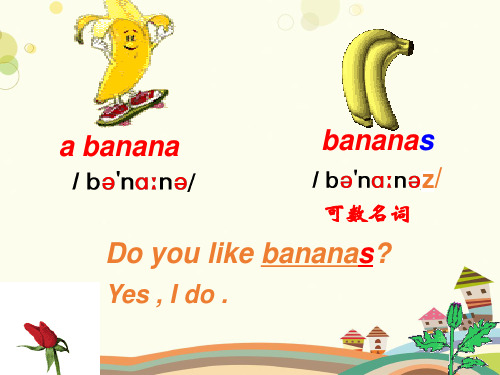

Unit 6 Do you like bananas一、阅读理解。
A【题文】Mum gives little Tom ten yuan. Then little Tom goes shopping. He gets on the bus and sits down next to an old woman. Then he sees the old woman’s bag is open. There is ten yuan in it. He quickly looks into his pocket. The money isn’t there now! Little Tom is sure that the old woman is a thief(小偷). He decides(决定)to take back the money from the old woman’s bag. So he carefully puts his hand into the old woman’s bag,takes the money and says nothing. Suddenly (突然地)the old woman shouts,“Where is my money? I can’t find it. There is a thief in the bus.” Little Tom feels str ange(奇怪的). Then he sees his own ten yuan under his seat. Little Tom is thinking a question now,“Am I a thief ?”1. 【小题1】 is sitting beside little Tom.A. A young womanB. An old womanC.A young manD. An old man2. 【小题2】 Little Tom sees in the old woman’s bag.A. a walletB. a packetC. ten yuanD. ten dollars3. 【小题3】 Litt le Tom is sure that the old woman is a .A. thiefB. teacherC. rich womanD. poor woman4. 【小题4】 Little Tom sees ten yuan under his seat.A. his ownB. the old woman’ sC. the thief’ sD.the driver’ s5. 【小题5】Which of the following is right?A. Little Tom is a bad boy.B. Little Tom often steals(偷)things.C. Mum gives little Tom twenty yuan.D. Little Tom makes a mistake(错误).【答案】1.【小题1】B2.【小题2】C3.【小题3】A4.【小题4】A5.【小题5】D【解析】试题分析:这篇短文讲述的是Tom在公交车上看到挨着他的老太太包里有10元钱,而他自己的 10元钱恰好不见了,他就以为是那个老太太偷了他的。
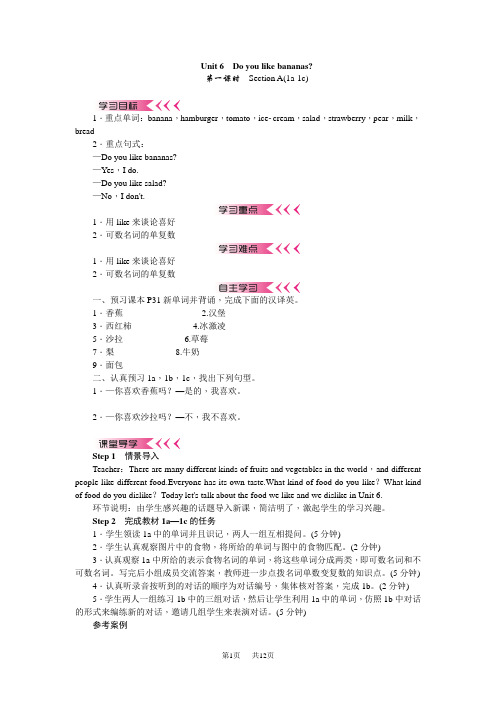
Unit 6Do you like bananas?第一课时Section A(1a-1c)1.重点单词:banana,hamburger,tomato,icecream,salad,strawberry,pear,milk,bread2.重点句式:—Do you like bananas?—Yes,I do.—Do you like salad?—No,I don't.1.用like来谈论喜好2.可数名词的单复数1.用like来谈论喜好2.可数名词的单复数一、预习课本P31新单词并背诵,完成下面的汉译英。
1.香蕉____________ 2.汉堡____________3.西红柿____________ 4.冰激凌__________5.沙拉____________ 6.草莓____________7.梨____________ 8.牛奶____________9.面包____________二、认真预习1a,1b,1c,找出下列句型。
1.—你喜欢香蕉吗?—是的,我喜欢。
________________________________________________________________________ 2.—你喜欢沙拉吗?—不,我不喜欢。
________________________________________________________________________Step 1情景导入Teacher:There are many different kinds of fruits and vegetables in the world,and different people like different food.Everyone has its own taste.What kind of food do you like?What kind of food do you dislike?Today let's talk about the food we like and we dislike in Unit 6.环节说明:由学生感兴趣的话题导入新课,简洁明了,激起学生的学习兴趣。

Unit 6 Do you like bananas?单词回顾香蕉汉堡包西红柿冰激凌沙拉草莓梨子牛奶面包生日正餐周,星期思考食物当然,肯定蔬菜水果正确的苹果那么蛋,鸡蛋胡萝卜大米,米饭鸡肉早餐午餐星星吃习惯健康的真正地问题问题想要肥胖的一.短语归纳:1。
John's birthday dinner 约翰的生日晚餐 2。
next week 下周3.think about 思考、考虑 4。
how about 怎么样5。
some fruit 一些水果 6。
his birthday 他的生日7。
sport star 体育明星 8.eating habits 饮食习惯9.for breakfast 作为早餐 10。
for dinner 作为晚餐11。
one last question 最后一个问题 12。
healthy food 健康的食品二.重点句型:1。
have sth 吃……2。
—Do you like…? 你喜欢…吗?—Yes, I do / No, I don’t. 是的,我喜欢/不,我不喜欢。
3。
—Does she / he like…?她/他喜欢…吗?—Yes, she / he does.—No, she/ he does’t4.I like/ don’t like…我喜欢/ 我不喜欢…5。
like … for breakfast / lunch / dinner 早餐/午餐/晚餐喜欢…6.want to do sth 想要做某事三.典句必背1。
I like hamburgers。
我喜欢汉堡包。
2. He likes ice—cream。
他喜欢冰激凌.3. —Do you like salad?你喜欢沙拉吗?— Yes, I do. / No, I don’t. 是的,我喜欢./ 不,我不喜欢。
4。
I don't like bananas。
我不喜欢香蕉。
5.I don't want to be fat。

初一英语Unit 6 Do you like bananas? 人教版(新目标)【本讲教育信息】一. 教学内容:Unit 6 Do you like bananas?(一)语言目标谈论爱好和厌恶。
(二)语言功能学会用英语表达自己喜欢或不喜欢的东西,询问别人是否喜欢,提出建议。
(三)重点句型Do you like bananas? Yes, I do./No, I don’t.I like French fries. I don’t like tomato es.(四)主题词表(五)重点词汇及短语词汇:like, hamburgers, tomatoes, broccoli, French fries, oranges, ice cream, salad, bananas, eggs, carrots, strawberry, apples, chicken, breakfast, lunch, dinner, fruit, vegetable.短语:a lot of like to do sth. like doing sth.(六)语法1. 动词like的用法。
2. 一般疑问句的肯定、否定回答。
3. 名词复数的使用。
(七)重难点分析:1. 可数名词和不可数名词(1)可数名词:①定义:是可以计数的名词。
②可数名词前可以用a,an限定。
③可数名词前可以用one,two,three…限定。
④可数名词有复数形式。
(2)不可数名词:①定义:指不能计数的名词。
②不可数名词前不可以用a,an限定。
③不可数名词前不可以用one,two,three…限定。
④不可数名词没有复数形式。
2. 一般名词的复数形式(1)一般在名词词尾加-s。
如:banana-bananas(2)以-o,-s,-sh,-ch及-x结尾的名词,在词尾加-es构成复数形式。
如:tomato-tomatoes (3)有些以-o结尾的名词仍加-s。
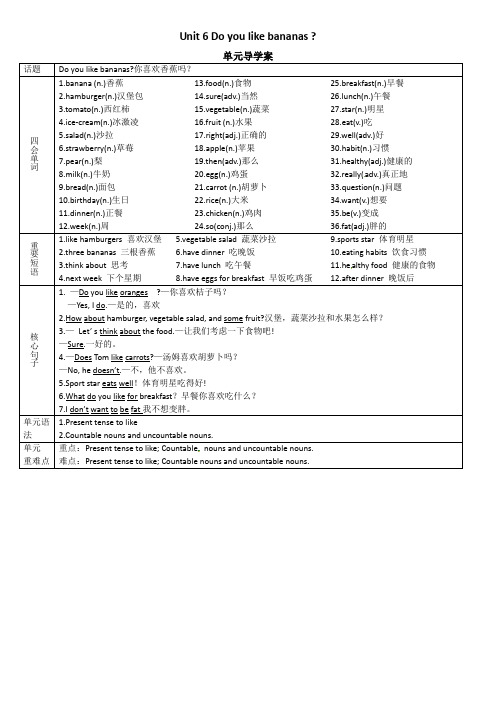

人教版英语七年级上册第五单元Unit 6 Do you like bananas?重点句子背诵同学们,英语的学习中,重点句子的积累至关重要,一方面,它们是语法知识的体现,另一方面,它们又是书面表达的基础,因此这些句子的积累和运用就显得至关主要。
接下来,我们就来总结一下七年级上册第六单元的重点句子。
1、Do you like bananas? 你喜欢香蕉吗?这是由助动词do帮助动词like引导的一般疑问句,由陈述句I like bananas得来。
回答:Yes ,I do. \ No , I don’t.2、Does she like tomatoes? 她喜欢西红柿吗?这是由助动词does帮助动词like引导的一般疑问句,由陈述句She likes tomatoes得来。
回答:Yes , she does. \ No , she doesn’t.同样,Does Tom like icecream?(汤姆喜欢冰激凌吗?)是由助动词does帮助动词like引导的一般疑问句,由陈述句Tom likes icecream.(汤姆喜欢冰激凌。
)得来。
回答:Yes , he does. \ No , he doesn’t.3、Do they like pears? 他们喜欢梨吗?这是由助动词do帮助动词like引导的一般疑问句,由陈述句They like pears得来。
回答:Yes , they do . \ No , they don’t.4、I like bananas. 我喜欢香蕉。
5、She likes hamburgers. 她喜欢汉堡包。
6、He likes icecream. 他喜欢冰激凌。
7、They like tomatoes and carrots. 他们喜欢西红柿和胡萝卜。
从第4句到第7句,要关注的点如下:第一,关注主谓一致:当主语是第三人称单数的时候,谓语动词用相应的第三人称单数形式,例如:She likes \ he likes\ Alice likes \ Tom likes等等;当主语不是第三人称单数的时候,谓语动词用原形,例如:I like \ They like \ We like \ Tom and Grace like等等。
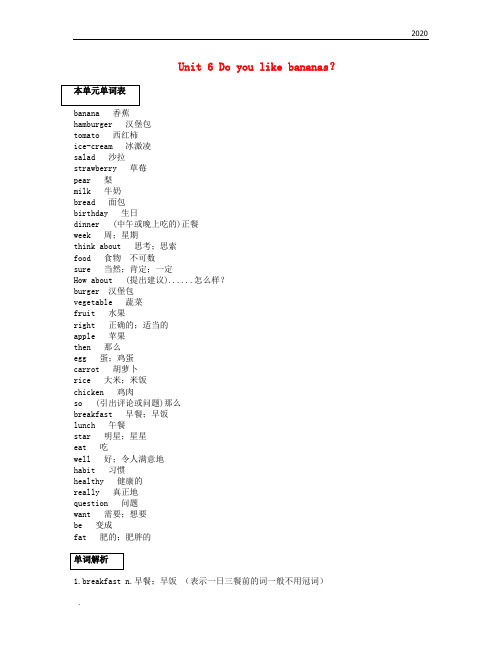
Unit 6 Do you like bananas?banana 香蕉hamburger 汉堡包tomato 西红柿ice-cream 冰激凌salad 沙拉strawberry 草莓pear 梨milk 牛奶bread 面包birthday 生日dinner (中午或晚上吃的)正餐week 周;星期think about 思考;思索food 食物不可数sure 当然;肯定;一定How about (提出建议)......怎么样?burger 汉堡包vegetable 蔬菜fruit 水果right 正确的;适当的apple 苹果then 那么egg 蛋;鸡蛋carrot 胡萝卜rice 大米;米饭chicken 鸡肉so (引出评论或问题)那么breakfast 早餐;早饭lunch 午餐star 明星;星星eat 吃well 好;令人满意地habit 习惯healthy 健康的really 真正地question 问题want 需要;想要be 变成fat 肥的;肥胖的1.breakfast n.早餐;早饭(表示一日三餐前的词一般不用冠词)【解析】①吃三餐习惯与动词have 连用,且为零冠词,但与形容词连用时,前面要加不定冠词a/an。
have breakfast 吃早饭have a good breakfast 吃一顿丰盛的早餐have a quick breakfast 早餐吃得很快②at breakfast 吃早餐时【扩展】brunch n.早午餐2. well adv.好;令人满意地【解析】常见搭配:do well in…在……做得好辨析good,fine,well,fine.① good 意为“好的,令人满意的”,常指物品的质量,人的品质等方面的好,也常与morning,evening,afternoon等词搭配表示问候。
Alice is a good girl. 爱丽丝是一个好女孩。

Unit 6 Do you like bananas?第3课时一、单词拼写1.We must eat v egetables ev ery day. They are good for health(健康).2.—What do you have for b reakfast?—Bread and mi lk.3.Don’t eat too many hamburgers(汉堡). They are unhealthy(不健康的).4.—Do you like chicken(鸡肉)?—Yes, I do.5.I like fruit(水果) very much. I like apples, bananas and oranges. 6.People here like rice(大米) for their meals.7.Some students like bread for lunch(午餐).8.I don’t like salad(沙拉).9.Let’s eat/have(吃) some rice.10.I like Chinese food(食物).二、句型转换11.Jim likes icecream.(改为否定句)Jim doesn’t like icecream.12.Betty doesn’t have carrots for lunch.(改为肯定句)Betty has carrots for lunch.13.She eats fruit every day.(改为一般疑问句)Does she eat fruit every day? 14.My sister likes eggs_and_apples for breakfast.(对画线部分提问) What does your sister like for breakfast?15.Does your father like c hicken for lunch ?(作否定回答)No,_he doesn ’t .三、用方框中所给词的适当形式填空eat , not have , like , they , apple16.He likes salad very much.17.Do you like apples,_Kate?18.Let’s eat some fruit, OK?19.His son doesn ’t_have an English dictionary.20.I love soccer and basketball and I play them every day.四、补全对话(有一项多余)Tom :Hello, Jack. What do you like for br eakfast?Jack :21.__D __ I think they ’re healthy.Tom :OK. 22.__E __ Do you like oranges?Jack :Well, I don ’t like oranges. 23.__F __Tom :What about lunch? Do you like salad?Jack :Yes, I do. 24.__B __Tom :Hmm...And do you like hamburgers for dinner?Jack :Oh, no, they ’re not healthy. 25.__A __五、语法填空My name is Bill. I have two good 26.friends(friend). They are Bob and Sandra. We eat different food every day.I like lots of food. For 27.breakfast(breakfast), I eat eggs and some fruit.I like oranges and bananas. For lunch, I have hamburgers and some salad. 28.For dinner, I have chicken and some vegetables.I like carrots and broccoli.Bob eats lots of 29.healthy(health) food every day. He 30.has(have) milk, two eggs and 31.an apple for breakfast. He has chicken and salad for lunch. And he 32.likes(like) broccoli and fish for dinner.Sandra is different from (we). She doesn’t eat fruit or vegetabl es. She only 34.ea ts(eat) unhealthy food.She likes French fries(薯条) and ice-cream.For breakfast, she eats hamburgers. 35.And for dinner, she eats French fries. After dinner, she eats ice-cream for dessert.六、任务型阅读根据短文内容,完成下列任务。



Unit 6 Do you like bananas? Part 1 Words and Expressionsbanana /bə'nɑːnə/ n. 香蕉hamburger /'hæmbɜː(r)gə(r)/ n.汉堡包tomato /tə'mɑːtəʊ/ /tə'meɪtəʊ/ n. 西红柿ice-cream /,aɪs'kri:m/ n.冰激凌salad /'sæləd/ n. 沙拉strawberry /'strɔːbəri/ n.草莓pear/peə(r)/ n. 梨milk /mɪlk/ n.牛奶bread /bred/ n. 面包birthday /'bɜː(r)θdeɪ/ n.生日dinner /'dɪnə(r)/ n.(中午或晚上吃的)正餐week /wiːk/ n.周;星期think about 思考;思索food /fuːd/ n.食物sure /ʃʊə(r)/ adv.当然;肯定;一定How about…? (提出建议)……怎么样?burger /'bɜː(r)gə(r)/ n. (= hamburger) 汉堡包vegetable /'vedʒtəbl/ n. 蔬菜fruit /fruːt/ n.水果right /raɪt/ adj.正确的;适当的apple /'æpl/ n.苹果then /ðen/ adv.那么egg /eg/ n.蛋;鸡蛋carrot /'kærət/ n.胡萝卜rice /raɪs/ n. 大米;米饭chicken /'tʃɪkɪn/ n. 鸡肉so /səʊ/ conj.(引出评论或问题)那么breakfast /'brekfəst/ n.早餐;早饭lunch /lʌntʃ/ n. 午餐star /stɑː(r)/ n.明星;星星eat /iːt/ v.吃well /wel/ adv. 好;令人满意地habit /'hæbɪt/ n.习惯healthy /'helθi/ adj. 健康的really /'riːəli/ adv. 真正地question /'kwestʃən/ n.问题want /wɒnt/ v. 需要;想要be /biː/ v.变成fat /fæt/ adj. 肥的;肥胖的Part 2:Texts课文(一)Jack: Hey, John’s birthday dinner is next week. Let’s think about the food. Tom: Sure. How about burgers, vegetable salad, and some fruit?Bill: Sounds good. John likes hamburgers.Jack: Oh, I don’t like salad.Bill:But John likes salad, and it’s his birthday.Jack:Yes, you’re right. What about the fruit?Tom: I think John likes strawberries and apples.Jack:OK. Let’s have strawberries and apples then.Structure——谈论好恶1.Do you like salad? Yes, I do./No, I don’t.2.Do they like pears? Yes, they do./ No, they don’t.3.Does she like tomatoes? Yes, she does./ No, she doesn’t.4.I like oranges. I don’t like bananas.5.We like rice. We don’t like hamburgers.6.He likes ice-cream. He doesn’t like vegetables.重点句型:Underline the correct words in the brackets.在括号内正确的单词下画线。
Unit 6 Do you like bananas (第三课时) Section A Grammer
focus-3c
【学习目标】1.1)Do you like…(某物)? 你喜欢…(某物)吗? Does he/she llke...(某物)?他/她喜欢……(某物)吗? 以上两个句型常用于问别人“对……(某物)喜不喜欢”以及构成的一般疑问句与否定句,并能作否定与肯定回答。
2学习并复习名词单复数.
【自主学习】预习课本第32页的单词和对话, 初步理解图片对话含义
【知识回顾】翻译下例短语。
1.birthday party ___________________2 .next week_________________
3 .think about _______________________
4 .What/how about_____________
【自学检测】短语翻译(请同学们关上课本独立完成,完成后对子间相互批阅。
)
蔬菜____________,鸡蛋________ 鸡肉_______ 那么__________牛奶____________
面包 _________水果__________________大米 _____________鸡,小鸡______________
1.Do you like bananas?(作肯定和否定回答)Yes,______ _____No ,_______ ___________
2.Does he like hamburgers?(作肯定和否定回答Yes ,______ ______No ,______ _____
3.I like hamburgers.(改为否定句) I _______ ___________ hamburgers.
4.They like ice_cream.(改为一般疑问句并作肯定回答)
______ they like ice_cream? Yes.________ _______ No________ ______
5 .He likes pears.(改为一般疑问句并作否定回答)
_______ he _____ pears? Yes.________ _______ No________ ______
【拓展提升】1.时间:10’ 2.训练方式:独立,自主完成
自评:师评:批阅日期:_______
一、基础题:补全对话,一空一词。
A:Do you 1 broccoli?B:Yes, I 2 . I like all vegetables.
A:How about you? Do 3 like carrots?
B:Yes, I do.It's great! Do you like 4
A:No, I 5 like vegetables. But I like 6 likebananas,oranges.
B:Do you like apples? I don't like apples.
A:Yes, I like apples.Do you know what I really(真正) like?
B:What?A:Ice 7 .
二、发展题:选择题
() 1. My sister likes some____________.
A.apple
B.banana
C.broccolis
D.salad
() 2. He ______ oranges. But he doesn't _______ orange.
A.like, like
B. likes, like
C. likes, likes
D.like , likes
() 3.Bill and Bob ________ like bananas.
A.does
B.don't
C.not
D.does
()4._____your brother ______French fries?
A. do like
B. does like
C. Does like
D. Do like
() 5.Does she like broccoli? ----__________.
A. Yes, she like.
B. No,she does.
C. Yes, she does.
D. No, he does.
三、提高题:按要求完成句子。
1.Jim and Bill like apples.(改为否定句子)
______________________________________________________________________
2. Miss green likes oranges.(改为一般疑问句)
______________________________________________________________________?
3 .Mary likes strawberries.( 改为否定句子)
______________________________________________________________________
4 .They don't like volleyball.(改为肯定句)
______________________________________________________________________
5 .He has a bananas.(改为复数句)
______________________________________________________________________
【学生自主反思】(写出今日一得和今日不足)
今日一得: _________________________________________
今日不足:_____________________________________________________________。